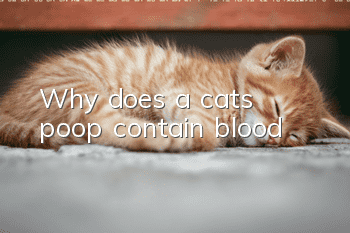Why does a cat’s poop contain blood?

Cats with blood in their stool may be caused by internal parasite infection, feline distemper virus, constipation, indigestion, damage to the intestinal mucosa, or other diseases. If the cat is accompanied by other uncomfortable symptoms in addition to blood in its stool, such as depression, fever, loss of appetite, etc., it is recommended to send the cat to a pet hospital for examination and treatment in time to avoid delaying the condition. If you find that your cat's feces is abnormal, you should find out the cause in time to avoid delaying precious treatment time.
1. Internal parasitic infection
Parasite is one of the most common causes of bloody stools in cats, such as roundworms, tapeworms, hookworms, etc., which can cause damage to the intestinal mucosa and cause bleeding. The phenomenon. In this case, it is recommended that the owner take the cat to the pet hospital for a fecal examination. If there are eggs, it is recommended to deworm the cat in time and repair the intestinal mucosa. In addition, owners also need to deworm the cat every three months to prevent the cat from having soft or loose stools.
2. Feline distemper virus
Feline distemper virus is a highly contagious viral infection. The main symptoms include loss of appetite, vomiting, diarrhea, blood in the stool, etc. It is mainly susceptible to age. Smaller cats. If the cat is young and has not been fully vaccinated, you need to consider this reason. It is recommended that you take the cat to the pet hospital for a check-up to be safest. If it is determined to be feline plague, the cat should be given infusion treatment as soon as possible.
3. Constipation
Cats defecate 1-2 times a day on average. If they are constipated for too long, the water in the stool will be absorbed by the intestines and gradually become hard. , Hard stool can cause damage to the intestines or anus, resulting in blood in the cat's stool. If the cat has mild constipation, you can feed it honey water or goat milk powder, and play with the cat regularly for a while every day to increase its amount of exercise. However, if your cat’s constipation is severe, you can take medications containing magnesium sulfate or lactulose orally under the guidance of a doctor. If necessary, you can use methods such as dew and enema to help your cat defecate.
4. Indigestion
If a cat eats too much or the food is not suitable, it is easy to suffer from indigestion, resulting in the cat’s feces being soft and bloody. If the symptoms are mild, you can give the cat some probiotics orally to regulate the gastrointestinal tract. If the cat is more serious and even affects its appetite, it is recommended that the owner take the cat to the pet hospital for examination and treatment as soon as possible.
5. Damage to the intestinal mucosa
Cats like to chew on things and may swallow needles, threads, plastics and other foreign objects without knowing it. If these foreign objects scratch the cat's gastrointestinal tract, it will cause damage and lead toBleeding will cause the cat to have blood in his stool. It is recommended that the owner take the cat to the pet hospital for examination. If necessary, surgery may be required to remove the foreign body.
6. Other diseases
Cats with blood in their stools may also be caused by the rupture or compression of polyps, tumors and other vegetations in the intestines. This situation requires an intestinal endoscope. Go for examination and removal, the prognosis is generally cautious, and the risks vary depending on the nature of the vegetation.
- Is there a difference between cat paws and dog paw prints? How to tell the difference?
- Does your cat refuse to be groomed? This is very important to her!
- Why is the cat twitching?
- Can cat heart disease be cured? Blood pressure and radiographic examination of cat heart disease!
- If a kitten meows as soon as it's locked in the cage, that's because you're not doing something right.
- Can cats bask in the sun?
- What are the causes of shortness of breath in cats? Shortness of breath in cats should not be underestimated!
- Can cats eat chicken bones? Why?
- What is the problem if a cat has purulent eye droppings in its eyes? What should a poop remover do?
- How to treat cat glaucoma



